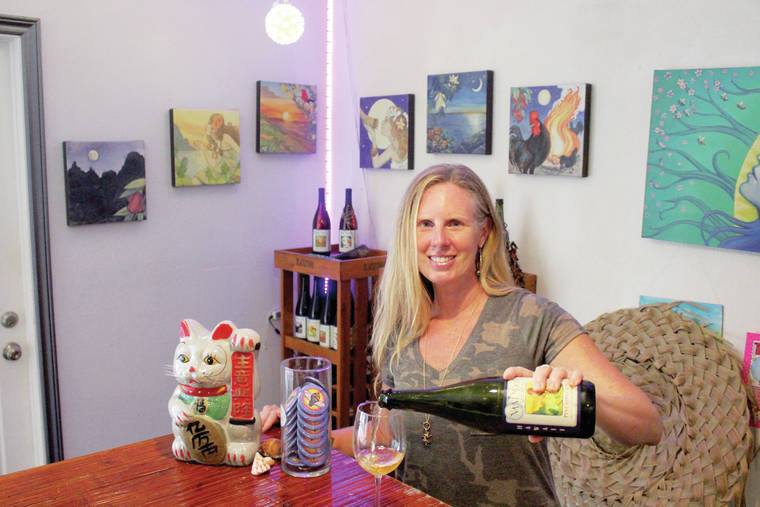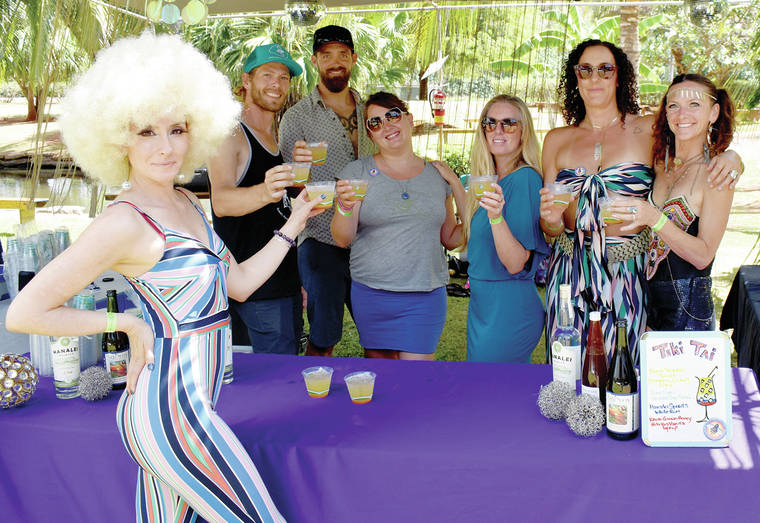Talk Story: Stephanie Krieger

Ryan Collins / The Garden Island
“Queen Bee” Stephanie Krieger, who owns and operates Nani Moon Meadery, pours one of her signature local mead spirits Thursday in Kapaa. Krieger and Nani Moon are celebrating 10 years of business in July.

Contibuted
Stephanie Krieger, left, and her Nani Moon crew, make a toast during the Taste of Hawaii. The Taste of Hawaii is one of the biggest events of the year for the company that is celebrating their 10-year anniversary in July.
Ten years ago, on July 20, 2009, Nani Moon Meadery and Queen Bee owner-operator Stephanie Krieger opened her doors to the public, offering 100% local, hive-to-table mead. As she approaches a decade of operating on Kauai and sending top-notch mead to tables across the county and the Hawaiian islands, Krieger sat down with The Garden Island to talk story about the things shes learned, how far shes come and where the meadery is headed.
Ten years ago, on July 20, 2009, Nani Moon Meadery and “Queen Bee” owner-operator Stephanie Krieger opened her doors to the public, offering 100% local, hive-to-table mead. As she approaches a decade of operating on Kauai and sending top-notch mead to tables across the county and the Hawaiian islands, Krieger sat down with The Garden Island to talk story about the things she’s learned, how far she’s come and where the meadery is headed.
Where did you get the idea?
I was making mead before I opened the business, but I was thinking that we came from the idea of trying to create value, economic value, through the natural resources. How do we make money from our natural resources? I really toned into the bees up in Kokee, the bees buzzing in the lehua trees, and I was like, “that gives economic potential for the native forest just by existing.” And so that was one of my main inspirations, and a few weeks later I was like, “you can make mead out of the honey.” So that’s where I decided to make mead. I had never drank mead that I like. So that’s really where that came from, and I just started in my garage in Kapahi.
When you tried that first batch, what was it like?
That’s what a lot of people ask me. I don’t remember. I know for one I had done a few batches and I was working at Gaylord’s at the time and I remember giving one to Andy, who was the head chef at the time, and he was like, “It’s too acidic.” So I was like, “OK, acid balancing. I need to work with balancing the acid, and super-acid fruits, you don’t use as much of them.” So then I started playing around with a balance between acids and more neutral flavors and all of that stuff to create stuff. My background was really in food and wine at that point. I was working at Gaylord’s and then I was at Roy’s and the Princeville Hotel, and I used all of that extensive wine knowledge and appreciation that they train in those restaurants to create the meads.
What have you learned over the years?
“A lot,” she says, giving off a healthy laugh.
So have you perfected it through trial and error?
In order to make it to this menu, anything on this menu has been made in five-gallon batches over and over again for at least three years. So we do not just experiment in these tanks. These meads we do not just conceptualize and put in a 200-gallon tank. We work with five-to-10-gallon batches regularly. I have small-batch seasonals that are released. We are actually going to be releasing our summer seasonals next (this)week. Those, if we have the capability of going commercial with them, might end up making it to the main drag here.
So you have six flavors on the menu and your seasonals?
Yeah, and we have reserves sometimes. Mountain apples are coming in on Saturday and we source our mountain apples from one single estate up in Kapahi. We’re going to be taking about 400 pounds in on Saturday and probably another 400 to 500 pounds the next following Saturday, and that should be enough to make our annual batch of Laka’s Nectar.
So all of it is made from farm to table?
It has to be from the Hawaiian Islands.
What does that give you as a business edgewise with relationships and getting the resources to make the mead?
We have our own hive to resource our own Kauai honey. Our beekeeper is a longtime friend of mine, and he’s been beekeeping for 18 years, and has been with us since we started. We have 40 hives total, so it basically supplies our needs for here. The lehua honey and the macadamia nut blossom honey come from the Big Island.
Do you get a lot of first-timers who come in here who don’t know what mead is?
Most people nowadays know what mead is. I would say about 85% who come in, it may be 70, but a good percentage know what mead is and have tasted mead at least once. Whereas 10 years ago no one knew what mead was. It was really picking up as a craft, but mostly the craft-beverage world. So even though these are crafted like wines, that popularity is more in the craft-beverage world.
For people who don’t know mead, what would you tell them it is?
The basic definition is an alcoholic beverage with a primary fermentable that is honey. Hops and grains make a beer, grapes make wine, rice makes the sake, honey makes the mead. You can’t make a mead without honey. Within that category, there is a whole world of styles and flavor and profiles. Ours are crafted like wine so they are 12 to 13% alcohol content. They are dry to semi-sweet so they drink like wines. They are lifestyle- and food-friendly. They are designed so if you drink a bottle of wine, you can drink a bottle of mead.
What other kinds of relationships have you started to create in the community by going from farm to table?
With our growers, our farmers. I actually just met one of our local seasonal guys that is so off the grid that he doesn’t have a phone. I saw him at the laundry mat this morning and he signed up for mountain-apple juicing on Saturday. It’s so cool that you have those little, harmonious relationships. I see farmers all the time at the farmers’ market that I resourced from and some small suppliers that I just got a batch of Sierra nom cherries for a seasonal batch that will be released in the fall for cherry mead. She was super excited that we sourced them and she would tell me about it.
Where can people get Nani Moon mead?
We have wholesale distribution. We can independently distribute to our small wine shops, restaurants that are here on the island. Our distributor is Southern Wine and Spirits. They take care of our corporate accounts like Foodland, Safeway, Big Save and interisland, so the rest of the island chain. We ship to the mainland direct out of here, so if a guest comes in, whether it is a local person who wants to ship back for their family or a guest comes from the mainland and wants to ship, we do direct-to-consumer shipping. So they are getting shipped exactly what they are tasting here. We pack everything onsite and we bring it to FedEx.
How many people do you typically employ?
Our tasting room is just run by one person on a regular day and we’re open five days a week. So between two of us, we can manage that really easy. Juicing, bottling, production, one to five people based on what we are doing.
Is there anything that people might like to know about your journey to this point?
I personally love the fact that we can take in the amount of fruit that we take in when the fruit is dropping off the tree like the mountain apple and make something out of it that is going to be delicious a year from now. You know mountain apples, they would perish in like 24 hours. For me being able to take this fruit in, give the farmer a regular supply of income from us. They know when that fruit is ready that we are going to buy it from them and be able to make something that is not going to go bad, that it is going to only get better with age, is super rewarding. Also, sharing with people who come in that they can enjoy something that is 100% local, so when they go into the breweries, all that beer that is made in Hawaii is only made in Hawaii. All those raw materials are sourced in from other places on the planet, but what we are doing is when they buy a bottle of our stuff — they are paying us, they’re paying the farmer, they’re paying the beekeeper. So they’re keeping all the money from that bottle. It stays on the island. It was originated on the island, and it stays on the island. So it only helps to keep the money on island. So it’s like creating a centralized economy, and I just think it is one of the most important things that we need to do here on Kauai because so much of our money gets thrown off the island. If you’re not buying local you are just basically giving your money to someone from the mainland or international, and that what kind of drains us as a community. But with us, we just try to keep it all on the island.
What do you think about Budweiser and their commercials and depiction of mead?
They’re only helping us in the industry. It’s fine. I think it’s good. The fact that Budweiser is talking about mead in their commercials gives us free advertising. They obviously see it as competition if they’re talking about it. They’re also signifying that mead is for snobby people.
Are you happy with where you are at or are their plans to expand?
We are totally planning on growth, but I really don’t like to discuss those. You will see us up and coming in a whole new setup. So 10 years have come and gone and I’ve learned a lot about marketing, build out, money, things like that. I was a mead maker when I started but now I am a mead maker and a businesswoman. I’ve learned so much and there is a whole ‘nother ball game coming. We’re just waiting on the right location.
Nani Moon Meadery is open Tuesday through Saturday from noon to 5 p.m. at 4-939 Kuhio Highway in Kapaa. Tastings can be scheduled by calling 651-2453.
•••
Ryan Collins, county reporter, can be reached at 245-0424 or rcollins@thegardenisland.com.

